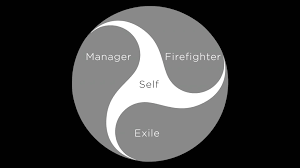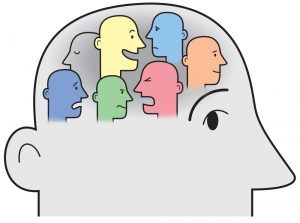Internal Family Systems Tool
This being human is a guest house.
Every morning a new arrival.
A joy, a depression, a meanness,
some momentary awareness comes
as an unexpected visitor.
Welcome and entertain them all!
Even if they are a crowd of sorrows,
who violently sweep your house
empty of its furniture,
still, treat each guest honorably.
He may be clearing you out
for some new delight.
The dark thought, the shame, the malice.
meet them at the door laughing and invite them in.
Be grateful for whatever comes.
because each has been sent
as a guide from beyond. (Rumi)
Background
Whilst this approach was created as a therapeutic model, I think it converts well to a coaching context (as with many other frameworks popping up in coaching related to CBT, Transactional analysis and others).
The internal family systems (IFS) model was created by Richard Schwartz. The principles are that we all have parts within ourselves, sub personalities like little people who have different goals and motivations; they have different levels of maturity, excitability, wisdom and pain. Every major school of psychology recognises that people have different sub personalities including Freud’s id, ego, and superego, and the ego states model in Transactional Analysis (parent, adult, and child).
How we get along with these different parts of ourselves depends on our internal leadership skills; how we listen to our different parts, make sure they are taken care of, and keep them from sabotaging each other. We may have positive parts within ourselves like warmth, creativity, being a carer; but we may also have elements of behaviour we dont like in ourselves like aggression, self loathing or an overblown inner critic.
IFS sees consciousness as composed of various “parts” or subpersonalities, each with its own perspective, interests, memories, and viewpoint. A core tenet of IFS is that every part has a positive intent for the person, even if its actions or effects are counterproductive or cause dysfunction. This means that there is never any reason to fight with, coerce, or try to eliminate a part; the IFS method promotes internal connection and harmony.
The parts
 Parts can have either “extreme roles” or healthy roles. IFS focuses on parts in extreme roles because they are in need of transformation through therapy. IFS divides these parts into three types—Managers, Exiles, and Firefighters.
Parts can have either “extreme roles” or healthy roles. IFS focuses on parts in extreme roles because they are in need of transformation through therapy. IFS divides these parts into three types—Managers, Exiles, and Firefighters.
Managers
Managers are parts with preemptive protective roles. They handle the way a person interacts with the external world to protect them from being hurt by others and try to prevent painful or traumatic feelings and experiences from flooding a person’s awareness. One example could be perfectionism, which means we don’t get picked on for making mistakes.
Exiles
Exiles are parts that are in pain, shame, fear, or trauma, usually from childhood. Managers and firefighters try to exile these parts from consciousness, to prevent this pain from coming to the surface.
Firefighters
Firefighters are parts that emerge when exiles break out and demand attention. These parts work to distract a person’s attention from the hurt or shame experienced by the exile by leading them to engage in impulsive behaviours like overeating, drug use, violence, or having inappropriate sex. They can also distract from the pain by causing a person to focus excessively on more subtle activities such as overworking, or over-medicating.
The Self
IFS also sees people as being whole, underneath this collection of parts. Everyone has a true self or spiritual centre, known as the Self to distinguish it from the parts. Even people whose experience is dominated by parts have access to this Self and its healing qualities of curiosity, connectedness, compassion, and calmness.
IFS sees the therapist’s job as helping the client to disentangle themselves from their parts and access the Self, which can then connect with each part and heal it, so that the parts can let go of their destructive roles and enter into a harmonious collaboration, led by the Self. IFS explicitly recognises the spiritual nature of the Self, allowing the model to be helpful in spiritual development as well as psychological healing.
Working exercise
You will find the overview and suggested working exercise by clicking on this link: Internal Family Systems
